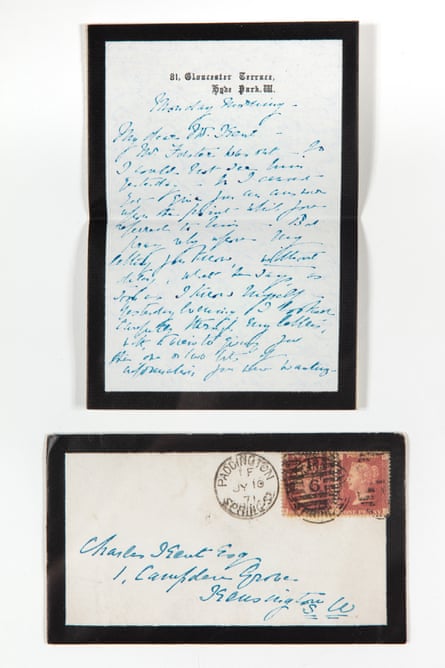The letters of Charles Dickens’ sister-in-law offer valuable perspectives on his life and lasting impact.
A selection of correspondence from a trusted friend of Charles Dickens will be exhibited in London for the first time this week, commemorating 212 years since the birth of the renowned author.
Georgina Hogarth, who served as both housekeeper and executor, was responsible for preserving Charles Dickens’ legacy after his passing in 1870. The letters were written by Dickens’ sister-in-law.
Emma Harper, a curator at the Charles Dickens Museum, stated that the recently acquired correspondence sheds light on a woman who greatly influenced Dickens during his life and even after his passing.

The extensive correspondence – a small portion of which will go on public display – was written by Hogarth to journalist Charles Kent between 1867 and 1898. It discusses Hogarth’s “unbearable” grief after Dickens’ death as well as her great admiration for the man.
Harper, who is currently working on decoding a collection of 120 letters at a pace of six per day, expressed hope that the letters would shed light on Dickens’ personal life and Hogarth’s involvement in it. She also noted the value of having the words of Georgina, considering that women were not as well documented during this period.
Hogarth was a companion to Dickens for 28 years and was present for many important moments in his personal life, including his divorce from his wife Catherine and his subsequent relationship with 18-year-old actress Ellen Ternan in 1858.
Together with John Forster, a biographer, she was one of the executors of Dickens’ will and had the duty of distributing his property. She also collaborated with the author’s daughter Mamie in editing three volumes of letters. Mamie was one of the ten children of Dickens whom she helped raise.
Harper emphasized the importance of learning more about Georgina’s life and her connection with Dickens. This includes examining their friendship and the role of women in the household of the renowned writer. The letters will greatly contribute to further research on her.
On the 7th of February 1871, which marked the first birthday of Charles Dickens after his passing, Georgina wrote to Kent expressing that living without her companion was extremely difficult and she longed for death. She added a disclaimer that she understood he was now in a state of happiness and blessings, and she would not bring him back to this bleak world even if she had the power to do so.
Bypass the advertisement for the newsletter.
after newsletter promotion
A few of the letters will be showcased in the study of Charles Dickens’ former residence, located at 48-49 Doughty Street in London. These letters were previously part of a private collection and were acquired by the museum for £6,048 through an auction in December. The funding for this purchase came from a V&A Purchase Grant and Arts Council England.
The current display at the museum highlights another important connection in Dickens’ life: his enduring friendship with fellow author Wilkie Collins.
Source: theguardian.com



